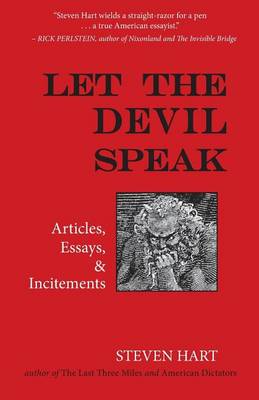The opening essay, "He May be a Fool, But He's Our Fool" was certainly a strong way to open. It's shocking how relevant an essay on the making of Randy Newman's album "Good Old Boys" could be in shining a light on the current political climate. It touched on the fallibility of memory, the civil rights movement, and also the subtlety of satire. It's also where the collection gets its name:
The principle is simple: If your story has a devil (and most stories do) then you have to let him talk. You have to give your villain - your devil - a speech, and you have to make it a good one...letting the devil speak is necessary, but dangerous. Sometimes the devil can make seductive arguments based on law and truth. But even when the devil speaks the truth, it is always in the service of a greater lie.
There was a lot to love about Let the Devil Speak. Each essay has a different focus and style, but every one of them is equally worthy. Even if you don't know the people or incidents that Hart is writing about, he gives such a sense of context that you feel you knew about them all along. The collection is not long, and despite the intelligence of its contents, was easy to read and understand. Essayist very often hide their points under language designed to either make the reader feel stupid or to ensure that the reader can congratulate themselves on their intelligence. Let the Devil Speak does neither. Hart doesn't moderate his vocabulary, but he also writes in a way that gives context and is therefore easy to follow.
What I like most about Let the Devil Speak is that it's relevant, not self-congratulatory. It says something important, and I think we should all take the time to listen.
